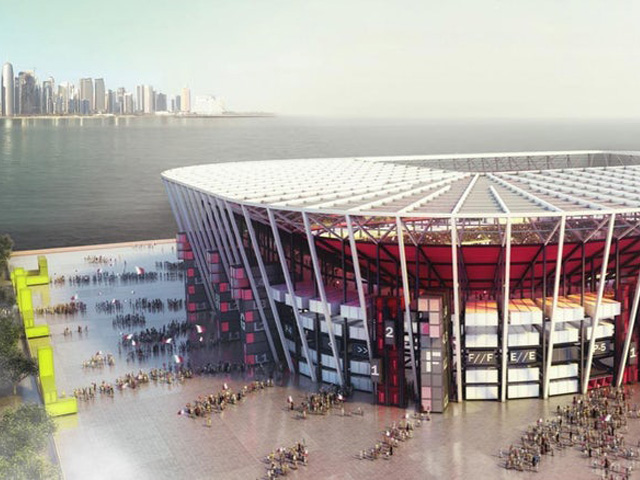MODULAR STADIUM A WORLD FIRST
30 Nov 2017
In an innovative move, the latest plan for the 2022 World Cup stadium in Qatar is a modular design that utilises shipping containers to create a demountable venue, which can be reassembled on another site or broken down into smaller venues after the event.

Plans are already underway for the 2022 Football (Soccer) World Cup in Qatar, with designs for a new stadium being released by the Supreme Committee for Delivery & Legacy (SC). Responsible for the event’s infrastructure, SC unveiled the plans for a demountable stadium, a world first, which will be built using modular building blocks comprised of shipping containers. 
The brainchild of Spanish firm Fenwick Iribarren Architects, the 40,000 seat venue will include removable units, including seats, concession stands, restrooms and various stadium elements that ensure the stadium will have longevity. The modular design means it can be disassembled and reassembled on another site, or possibly broken down into smaller venues. 
To be erected in Doha along the waterfront, the Ras Abu Aboud Stadium will require fewer materials in its construction, create less waste, and reduce the carbon footprint of the building process. The modular design also means that the potential for continued use after the Cup is over is increased - avoiding the fate of abandonment that many sporting venues suffer once an event has passed. 
“Innovation has always been central to our plans for delivering a historic FIFA World Cup that leaves a legacy for Qatar and the world, and there is no better example of this than the design of Ras Abu Aboud Stadium,” says SC Secretary General H E Hassan al Thawadi.
“This venue offers the perfect legacy, capable of being reassembled in a new location in its entirety or built into numerous small sports and cultural venues.” 
More than just a sporting field, the stadium precinct offers visitors views over Doha’s landmark Corniche, waterfront promenade, and into the downtown West Bay area. Construction is already underway on the stadium, with completion set for 2020. 
The committee hopes that the innovative design of the 2022 World Cup stadium will become a model of sustainability in the industry. “I'm delighted with this design and confident that Ras Abu Aboud will become a blueprint for future mega-event planners to follow," says H E Hassan al Thawadi.
Images courtesy of Fenwick Iribarren Architects

MORE NEWS

BUILDING GREAT SKATEPARKS FOR EVERYONE

A PLAYGROUND IN HARMONY WITH NATURE

BREAKING BARRIERS WITH THE WE-GO-SWING®

HOW PLAYCO PLAYGROUND MARKINGS ENHANCE PLAY, LEARNING AND SAFETY

HOW TO ENSURE YOUR DESIGN COMPLEMENTS THE SURROUNDING ARCHITECTURE

